This past weekend I headed down to the annual summer retreat of the Northwest Environmental Defense Center. It was held, as it has been for many years running (around 20, I think), at a little camp called Westwind, perched on the Oregon coast at the mouth of the Salmon River.
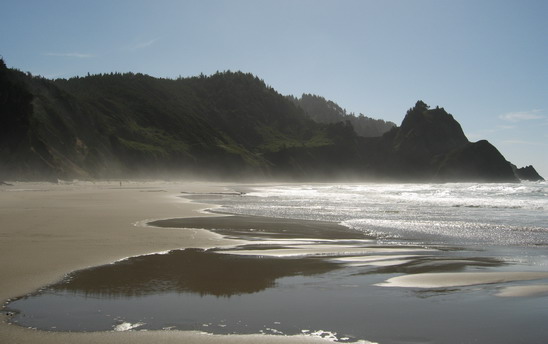
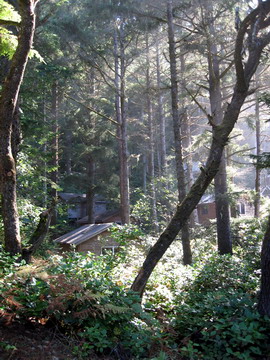 What to say? First, Westwind itself is amazing. It’s like a technicolor caricature of Natural Beauty, all towering trees and shimmering mists and glistening beaches. The thrum of the waves is a calming heartbeat. Haste and stress are impossible. At first it scarcely seems real, but after only a short while it is the mad industrial rush of roads and regimens — modern life — that begins to seem like a distant dream.
What to say? First, Westwind itself is amazing. It’s like a technicolor caricature of Natural Beauty, all towering trees and shimmering mists and glistening beaches. The thrum of the waves is a calming heartbeat. Haste and stress are impossible. At first it scarcely seems real, but after only a short while it is the mad industrial rush of roads and regimens — modern life — that begins to seem like a distant dream.
The only way to reach the camp is by barge across the river and a short hike up a sandy trail. Most visitors camp in tents, but there are also rudimentary cabins tucked away in the trees like little Elven warrens. My son was quite excited about the cabin, which, as he remarked more than once, “has one room!” The fact that we had to go to another building to use the bathroom seemed indescribably adventurous to him.
Best of all: no cell phone reception or computers.
All NEDC meals and meetings were communal, centered in the main camp lodge:
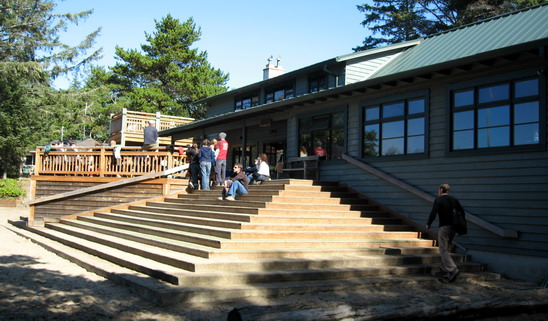
A word about NEDC (you can read the website for more info). It is a core group of law professionals and professors at Lewis & Clark law school who organize law student volunteers to track down pollution and sue polluters, either alone or in concert with other environmental groups. For instance, this article (PDF) from the Sunday Oregonian describes them paddling about in kayaks on the Columbia Slough, taking water samples and nailing local industries. They’ve won more financial penalties than the Oregon Department of Environmental Quality.
It’s a model for how to run a lean, mean, focused, effective grassroots environmental organization.
I suppose to them I was somewhat exotic — the smartypants journalist from Seattle — but I’ll be honest: being in the presence of people who do more than talk, who go out and do field work and organize and research and get into the nuts and bolts of creating change … it’s humbling for me. I was in something close to awe listening to these kids talk about how hard they’ve fought to make things better, and how committed they are to fighting. It’s utterly foreign to my nature. I’m a cerebral guy, and a bit of a misanthrope to boot. I sit and type. But no matter how many thousands of words I crank out, nothing I do amounts to anything next to these scruffy law students who actually get up in the morning and climb into kayaks.
I was one of three or four speakers over the weekend; I spoke before dinner on Saturday night, to a crowd of around 20-30. This is the view from where I was standing (imagine kids on the benches):
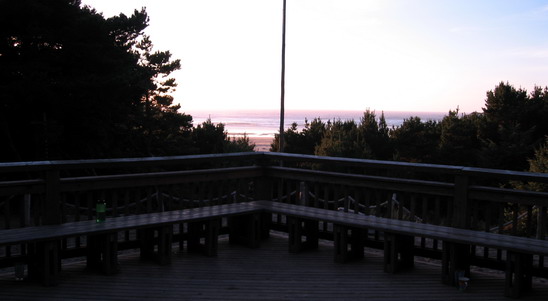
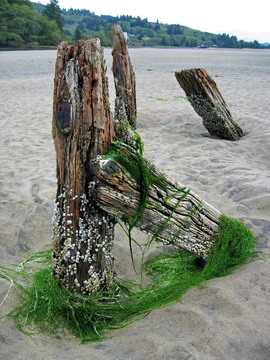 My talk was billed as being about "Hope," but I’m afraid that was a bit misleading. In fact it turned out be be fairly depressing. I feel guilty about it.
My talk was billed as being about "Hope," but I’m afraid that was a bit misleading. In fact it turned out be be fairly depressing. I feel guilty about it.
I started out by reviewing the two great environmental challenges facing humanity today: global warming and peak oil. First I went over their probable effects (familiar to folks here). Then I spent a moment discussing some reasons why they are even more difficult than they might appear upon first description: they involve complex science; the time lag between cause and effect is long and uncertain; the main culprits will be affected the least and the latest; there are no effective global institutions to coordinate action; they are quite radical in a time when most people (in the developed world anyway) live in affluence and comfort; they are taking place at a time when political life in the most powerful country in the world has become degraded, stupid, and addicted to fear and anger. And so on.
So, is there hope? Well, let’s think about that word, hope, and the ambiguity in it. One dictionary defines it as "an emotional belief in a positive outcome." Emotional belief? The emotional and the intellectual are run together. Let’s pick them apart.
Intellectually speaking, do I see a path from here to a world on the far side of these problems? Do I see any way to tackle them while avoiding immense suffering and disruption?
Frankly, no. I do not think we can rationally expect to overcome these problems in a peaceful, coordinated, intelligent way. In that sense — the intellectual sense — no, I’m not hopeful.
But while human perfidy and destruction have always been somewhat predictable and explicable, great human achievements are almost always miraculous. When Gandhi and his band of poor, grubby Indian peasants, all of whom had vowed not to raise a hand, were surrounded by the racist British army, the most powerful in the world, would it have been rational for him to predict a stable, independent Indian democracy? When the U.S. was riven by civil war and people were dying by the hundreds of thousands over intractable economic and cultural divisions, would it have been rational to predict a unified, prosperous U.S.?
No.
Every great teacher, from Jesus to Gandhi to MLK Jr., has had the same message: fight for those who cannot defend themselves, not because you’ll find success, but because they cannot defend themselves. Fight to defend this bounteous, beautiful natural world, not because you’ve plotted a mathematical course from here to your goals, but because it is bounteous and beautiful. Be a good person, not for what it will bring you, but because it is good. It’s part of being fully human.
Do I have the "emotional belief in a positive outcome"? I can’t say I have the belief. But I — we — have the emotion. We have love. For our families, for our communities, for humanity, for the earth. That’s enough.
At least I hope so.


